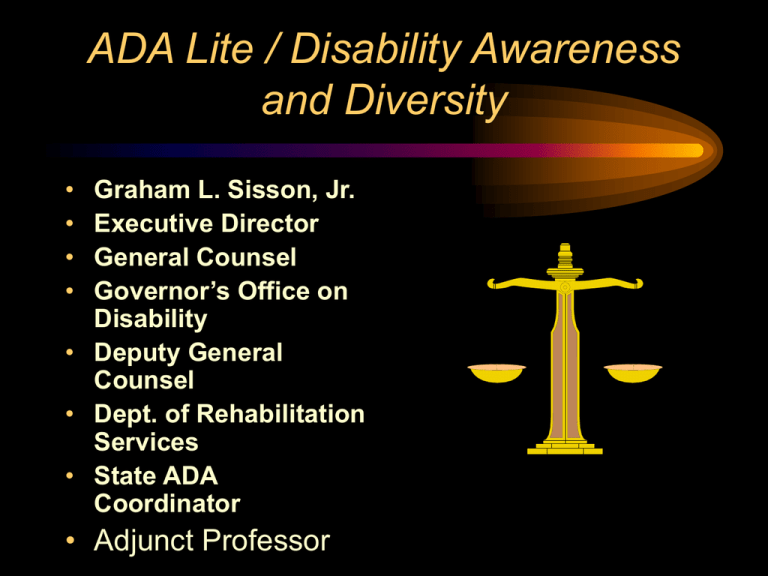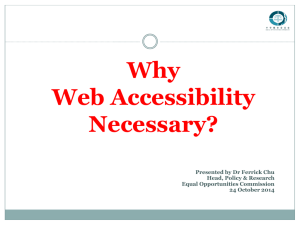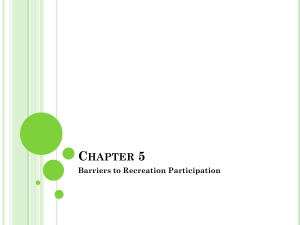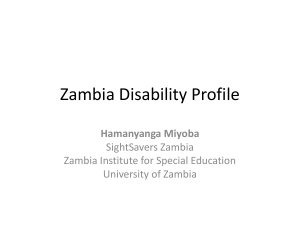
ADA Lite / Disability Awareness
and Diversity
•
•
•
•
Graham L. Sisson, Jr.
Executive Director
General Counsel
Governor’s Office on
Disability
• Deputy General
Counsel
• Dept. of Rehabilitation
Services
• State ADA
Coordinator
• Adjunct Professor
Contact Information
• 800-205-9986 ADA Hotline
• 205-290-4540 Bham Office
• 334-293-7189 Mont’gy Office
• Graham.sisson@rehab.alabama.go
v
• Graham.sisson@good.alabama
.gov
• All information provided is
non-binding
• Ultra-Reader’s Digest
Version
• ADA Update Basics
• Disability as part of Diversity
My Personal Experience
• Injured in 1982 motor vehicle collision with drunk
driver
• Paralyzed from waist down and suffered a closed
head injury
• Attended college and law school using a wheelchair
• Suffered some employment discrimination
• Have experienced public perception of PWD
–
–
–
–
5 dollar episode
Restaurant example
Decreased expectations
Want to live American dream
Disability Specific Laws
•
•
•
•
•
•
Americans With Disabilities Act (ADA)
ADA Amendments Act of 2008
Rehabilitation Act of 1973 , Section 504
Individuals With Disabilities Education Act (IDEA)
Fair Housing Act, as amended in 1988 (FHA)
Air Carriers Access Act of 1986
ADA OVERVIEW
•
•
•
•
MAINSTREAMING
EQUAL OPPORTUNITY
ACCESS
CIVIL RIGHTS
Five Titles of the ADA
• Title I: Employment
•
Title II : Public Entities
• Title III: Public Accommodations (private
businesses)
•
Title IV: Telecommunications
•
Title V: Miscellaneous
Definition of Disability
• Physical or mental impairment that
substantially limits a major life activity or
• Record of impairment or
• Being regarded as having an
impairment
U.S. Supreme Court Decisions
Impact
• Sutton trilogy
– Three decisions that mandate consideration of
corrective or mitigating measures when
determining substantial limitation
– Sutton: eyeglasses
– Murphy: high blood pressure medication
– Kirkingburg: behavior modification for monocular
vision
• Toyota v. Williams
– To be an ADA disability must substantially limit
activities of central importance in life
ADA Amendments Act (ADAAA)
of 2008
Became law on September 25, 2008.
90 to 95% of ADAAA concerns the definition of
disability
Reverses Sutton and Toyota decisions
Also clarifies that covered entities under the ADA do
not have to accommodate those regarded as having
a disability.
It became effective on January 1, 2009.
Shifts emphasis from whether or not there is a
disability to whether there has been discrimination.
New EEOC draft regulations, possibly will be
retroactive to January 1, 2009.
Major life activities
• The ADA Amendments Act
has the following nonexclusive list:
• Caring for oneself
• Performing manual tasks
Learning
Breathing
• Reading
Seeing
• Hearing
Speaking
• Eating
Concentrating
• Sleeping
Thinking
• Walking
Communicating
• Standing
Working
• Lifting
Bending
Major Bodily Functions
• ADAAA Also defines major life activities to include
major bodily functions like
–
–
–
–
–
–
–
–
–
–
–
Immune system
Normal cell growth
Digestive
Bowel
Bladder
Neurological
Brain
Respiratory
Circulatory
Endocrine
Reproductive
Exclusions
• “Regarded As” Disability does not include
impairments that are transitory or minor.
• Transitory means an impairment with an
actual or expected duration of 6 months or
less.
• Can consider corrective measures of
eyeglasses or contact lenses
• Episodic conditions or those in remission are
covered if there is a substantial limitation
when active.
Do Not Be Afraid of Workplace
Accommodation
• According to a survey between January 2004 and December
2006 by the University of Iowa Law , Health Policy, and
Disability Center in partnership with JAN:
• Of the employers who gave cost information related to
accommodations they had provided, 167 out of 366 (46%) said
the accommodations needed by employees and job
applicants with disabilities cost absolutely nothing. Another
165 (45%) experienced a one-time cost. Only 25 (7%) said the
accommodation resulted in an ongoing, annual cost to the
company and 9 (2%) said the accommodation required a
combination of one-time and annual costs; however, too few of
these employers provided cost data to report with accuracy. Of
those accommodations that did have a cost, the typical
one-time expenditure by employers was $500. When asked
how much they paid for an accommodation beyond what they
would have paid for an employee without a disability who was in
the same position, employers typically answered around $300
Reverse Discrimination
• The ADAAA clarifies that there is no
reverse discrimination based on
disability.
Hostile Work Environment
• Disability Harassment
Disability as Diversity
• Equal part of diversity
• Persons with disabilities have a
separate culture
• Largest minority in U.S.
– 58 PWD in U.S.
– Over 945,000 in Alabama
New ADAAG
• Compliance with the 2010 Standards for Accessible Design is
permitted after that date, but not required until 18 months after
the date of publication (September 15, 2010).
• Covered entities are given the choice of following the new
standards or original standards (ADAAG 1991) during the first
18 months after September 15, 2010 for new construction or
substantial renovation.
• After 18 months, use of the 2010 standards will become
mandatory (March 15, 2012).
• Safe Harbor: Elements in covered facilities built or altered
in compliance with 2010 standards are not required to be
brought into compliance with the 2010 standards until such
elements were subject to a planned alteration.
2010 ADA Standards for
Accessible Design
• Changes to the 1991 Standards
– The 2010 ADA Standards for Accessible
Design contain more than incremental
changes.
Reach Ranges
• Reach Range Requirements (Section 308)
– The reach range requirements have been
changed to provide that the side reach range must
now be no higher than 48 inches (instead of 54
inches) and no lower than 15 inches (instead of 9
inches).
– The side reach requirements apply to operable
parts on accessible elements, to elements located
on accessible routes, and to elements in
accessible rooms and spaces.
Toilets/Water Closets
• Water Closet Clearances in Single User Toilet Rooms
(Sections 603, 604)
– In single-user toilet rooms, the water closet now
must provide clearance for both a forward and a
parallel approach
– and, in most situations, the lavatory cannot
overlap the water closet clearance.
– The in-swinging doors of single use toilet or
bathing rooms may swing into the clearance
around any fixture if clear floor space is provided
within the toilet room beyond the door´s arc.
Other Changes
• Assembly area requirements (Sections 221,
802)
• Location of Accessible Routes to Stages
(Section 206)
• Transient Lodging Guest Rooms (Sections
224, 806)
• Common Use Circulation Paths in Employee
Work Areas (Sections 203.9, 206.2.8)
• Still others …
New Title II and III
Regulations
• In general, these final rules will take
effect 6 months (March 15, 2011) after
the date on which they are published in
the Federal Register. (September 15,
2010).
• Same safe harbor as ADAAG
New Title II and III Regs.
• Definition of service animal basically includes only dogs with
limited exceptions.
• Dogs used only for emotional support are not service animals.
• The final rule also clarifies that individuals with mental
disabilities who use service animals that are trained to perform a
specific task are protected by the ADA.
• The rule permits the use of trained miniature horses as
alternatives to dogs, subject to certain limitations. To allow
flexibility in situations where using a horse would not be
appropriate, the final rule does not include miniature horses in
the definition of "service animal."
• Wheelchairs and other power-driven mobility devices must be
allowed in all areas open to pedestrian use.
• Includes VRI (Video Remote Interpreting) as a kind of auxiliary
aid to provide effective communication.
New Regs.
• Ticketing. The rule provides guidance on the sale of
tickets for accessible seating, the sale of season
tickets, the hold and release of accessible seating to
persons other that those who need accessible
seating, ticket pricing, prevention of the fraudulent
purchase of accessible seating, and the ability to
purchase multiple tickets when buying accessible
seating.
• It requires a venue operator to accommodate an
individual with a disability who acquired inaccessible
seating on the secondary ticket market only when
there is unsold accessible seating for that event.
Residential Housing
• Residential housing programs provided by
title II entities are covered by the ADA.
• For the first time, however, the final rule
establishes design requirements for
residential dwelling units built by or on behalf
of public entities with the intent that the
finished units will be sold to individual
owners.
• These design requirements are set forth in
the 2010 Standards.
Title III New Regs. Highlights
• Ticketing, Service Animals, mobility
devices, and VRI: same new rules as
Title II.
New Title III Regs.
•
Reservations Made by Places of Lodging. The rule establishes
requirements for reservations made by places of lodging, including
– procedures that will allow individuals with disabilities to make reservations
for accessible guest rooms during the same hours and in the same manner
as other guests,
– and requirements that will require places of lodging
• to identify and describe accessible features of a guest room,
• to hold back the accessible guest rooms for people with disabilities until all other
guest rooms of that type have been rented,
• and to ensure that a reserved accessible guest room is removed from all
reservations systems so that it is not inadvertently released to someone other
than the person who reserved the accessible room.
•
•
The final rule limits the obligations of third-party reservation operators
that do not themselves own and operate places of lodging.
In addition, to allow the hospitality industry appropriate time to change
reservation systems, the final rule gives places of lodging 18 months
from the date of publication to come into compliance with these
requirements.
Timeshares/Condos/New Title III
Regs.
• Timeshares, Condominium Hotels, and Other Places of Lodging:
The rule provides that timeshare and condominium properties
that operate like hotels are subject to title III, providing guidance
about the factors that must be present for a facility that is not an
inn, motel, or hotel to qualify as a place of lodging.
• The final rule limits obligations for units that are not owned or
substantially controlled by the public accommodation that
operates the place of lodging.
– Such units are not subject to reservation requirements relating to
the "holding back" of accessible units.
– They are also not subject to barrier removal and alterations
requirements if the physical features of the guest room interiors are
controlled by their individual owners rather than by a third party
operator.
Disability Awareness
•
•
•
•
Disability Etiquette
Make eye contact
Speak to person with a disability directly
Never ask someone associated with a
PWD what that person needs or wants
• Do not be afraid- PWD are people first
Offering Assistance
• Before helping a PWD, ask him or
her
• Do not be upset if someone refuses
help
• Ask the person how they prefer to
be helped as he or she knows best
• "The beginning of wisdom is to call
things by their right names."
Old Chinese Proverb
• "The difference between the right word
and the almost right word is the
difference between lightning and the
lightning bug."
Mark Twain
Why Care About Disability?
• Disability does not demean or lessen a
person's self worth or his or her ability to
contribute to society.
• Disability is a natural part of the human
experience. If you help people with
disabilities, you will be helping yourself
one day or a family member or a friend.
Anyone can acquire a disability in a split
second. (TAB)
• Disability is an equal part of diversity as
race or sex or national origin except that
is crosses all social strata.
People First Language
• Always refer to the person first:
• Example: “person with a disability”, not “disabled”
person
• Do not use “handicapped person”
• “Handicap” has origins that make it synonymous with
“beggar.”
• Others words to avoid : “ cripple, invalid, wheelchair
bound, confined to a wheelchair” etc.
• More words to avoid: “differently abled”, “challenged”,
“able bodied”, “special”, “gimp” or “gimpy”, “afflicted”,
“suffering from”, “intellectually disabled”...
Language
• Caveat: do not avoid speaking to someone
with a disability out of fear of saying the
wrong thing.
• Example: Ok to say to a person with a visual
impairment “see you later.”
• Many PWD have a sense of humor.
• Do not allow a negative experience with one
PWD to cloud attitude toward other PWD
Myths
• All PWD meet in a convention each year or
know each other
• PWD cannot work
• Disability is contagious
• PWD are superheroes or “inspirational.”
• PWD can live off the government
• PWD are "victims"
• PWD have everything paid for them
• PWD are few in number
TRUTH
• Disability is a natural part of the human
experience
• There are approximately 54 million
PWD
• In Alabama there are approximately
945,000 PWD
• PWD want to be fully contributing
members of society
• PWD want what everyone else does: family,
job, transportation, happiness, etc.
TRUTH
• People with disabilities can work.
• Do not be afraid to include them in your
workforce.
• Education and assistive technology are
2 great equalizers that enable
individuals with disabilities to be
successful on the job.
Thank you
• ANY QUESTIONS?
• THE END!








